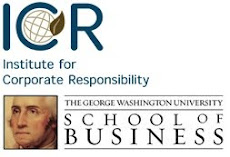In determining which business school to attend, I used resources such as Aspen Institute’s Beyond Pinstripes and Net Impact’s annual b-school rankings to narrow down the field. When it came time to make my decision, GW’s involvement with Net Impact and its leadership in weaving ethics, sustainability, and the like into the fabric of the program tipped the balance and here I am today.
After a fast-paced but enjoyable module 1 in which I suffered from the tunnel vision one gets when navigating 6 classes in as many weeks, I was amped to attend the Net Impact Conference in Ann Arbor. Occurring one week after our first set of finals, it presented the perfect opportunity to put academics aside and reconnect with what drew to me to business school in the first place.
I came to GW to become a better problem solver, and the problems I wanted to help solve were the focus of this conference. I set loose goals going in, knowing that the weekend would inspire more questions than provide answers.
Among the many questions swirling through my head when I boarded the plane after a great weekend, there was one that stood out: intrapreneurship or entrepreneurship?
Whatever I end up doing after business school, my primary motivation will be solving problems and helping people. How should I express this through my career? Should I go the CSR route and push for change from within an organization? Or should I heed the advice of Gary Hirshberg (founder and CE-YO of Stonyfield Organic) or Majora Carter (economic consultant and environmental justice advocate) who both make convincing arguments for building from the ground up?
Both paths feature excitement, opportunity, advantages, and disadvantages. With CSR and intrapreneurship, there is the opportunity to change well-established organizations. The size of a Wal-Mart or Coca-Cola is such that any change you make will have a far-reaching impact. You learn from people who have been in business a long time and have a chance to develop into a seasoned professional. This is appealing to someone like me who will re-enter the workforce in 2012 with less than 3 years of professional experience on the books. Furthermore, there is something to be said for the notion that the most effective agents of change are those who understand and have lived the system. Only after a year and change at Ashoka’s Youth Venture was I able to push through effective programs in my area.
With entrepreneurship, you avoid the risk of getting sucked into the belly of a slow-moving organization. You avoid the situation of taking a position in marketing or HR when what you really want is to work on sustainability. With entrepreneurship, it is your ship to steer. You can move the ball forward as fast or as slow as you want to, and apply pressure to incumbents who are not altering their behavior fast enough.
There are downsides to this path as well. There is the risk that you fail completely. Even if you are successful and your organization is doing wonderful things, you may have a hard time achieving the scale needed to make a big impact. Is an hour spent working to increase the success of your start-up better than an hour spent working to make Wal-Mart more socially responsible?
Of course, the choice is not simply between entrepreneurship or intrapreneurship, start-up versus incumbent. There are a variety of options in between – established-mid size organizations or start-ups with a couple of years under their belt.
The purpose of this post is not to endorse one path over the other. Rather, it is to share with you my still evolving thought process on a career in effective change making.
John Dillman Global MBA, 2012





No comments:
Post a Comment